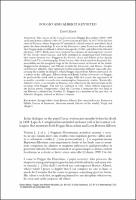Chapter Poggio and Alberti Revisited
Abstract
The careers of the Curial secretaries Poggio Bracciolini (1380-1459) and Leon Battista Alberti (1404-1472) reveal many parallels. In 1437-1438 the Este court of Ferrara, where Eugenius IV convoked a church council, provided a focal point for their friendship. It was to the Ferrarese canon Francesco Marescalchi that Poggio dedicated Book 1 of his Latin epistles (1436), and Alberti his Hundred Apologues (1437). Both men were inspired to critiques of contemporary society by the Greek satirist Lucian, and both indulged in composing brief witticisms that expose human vice: Poggio in his Facetiae (Jests) and Alberti in his Apologi (Fables) and Vita (Autobiography). From Lucian, they also learned to dramatize human foibles on the imagined stage of the theatrum mundi, or theater of the world: Poggio in his dialogues, and Alberti in both the Intercenales and Momus. Despite such literary affinities, their approach to ethical questions differed, especially concerning the validity of allegory, which Poggio rejected but Alberti embraced. As a tribute to his colleague, Alberti dedicated Book 4 of his Intercenales to Poggio; he prefaced the work with an ironic Aesopic fable that asserts the superiority of recondite scientific research over commonplace humanistic studies. Eventually, Alberti’s status as an outsider in Florence was reflected in the deterioration in his relations with Poggio. The rift was widened in 1441, when Alberti organized the Italian poetic competition called the Certame Coronario that was held in the Florence cathedral on October 22. Poggio was a member of the jury that, to Alberti’s chagrin, refused to declare a winner.


 Download
Download Web Shop
Web Shop